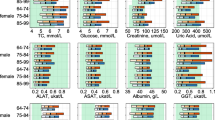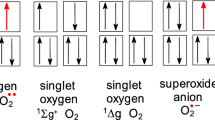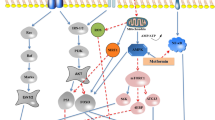Abstract
Pycnogenol (procyanidin extracted from Pinus maritima) has been shown to be a potent free radical scavenger and an antioxidant phytochemical. The effects of pycnogenol on immune and haemopoietic dysfunction in senescence-accelerated mice (SAM), as a murine model of accelerated ageing, were determined. SAMP8, a strain of senile-prone mice, exhibit learning and memory deficits, immunodeficiency and dysfunction of the haemopoietic system. Oral feeding with pycnogenol for 2 months significantly improved their T- and B-cell function. Pycnogenol also augmented the proliferative capacity of haemopoietic progenitors of bone marrow in SAMP8. These data suggest that pycnogenol may be useful for either retardation or restoration of parameters associated with ageing.
Similar content being viewed by others
Author information
Authors and Affiliations
Corresponding author
Additional information
Received 3 July 1998; accepted 28 July 1998
Rights and permissions
About this article
Cite this article
Liu, F., Zhang, Y. & Lau, B. Pycnogenol enhances immune and haemopoietic functions in senescence-accelerated mice. CMLS, Cell. Mol. Life Sci. 54, 1168–1172 (1998). https://doi.org/10.1007/s000180050245
Published:
Issue Date:
DOI: https://doi.org/10.1007/s000180050245




